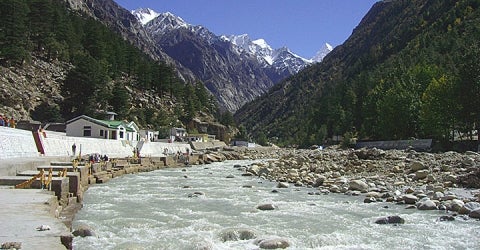Note: Yale School of the Environment (YSE) was formerly known as the Yale School of Forestry & Environmental Studies (F&ES). News articles and events posted prior to July 1, 2020 refer to the School's name at that time.

Video: Meet Alark Saxena
Spanning thousands of miles, and connecting the great Asian powers of China and India, the Himalayan region is among the most ecologically and culturally diverse parts of the world.
The Himalayan region — often referred to as the planet’s “third pole” because of the enormous volume of glacial ice that is so critical to its vast network of interconnected eco-regions and the people who live in them — is also one of the world’s most vulnerable.
This semester, the Yale School of Forestry & Environmental Studies (F&ES) will introduce a new online course exploring the complexities of this vital region, the challenges it faces, and how it can achieve a more sustainable future.
During the six-week course, “Himalayan Diversities: Environment, Livelihood and Culture (F&ES738Eb),” students will be able to watch weekly lectures at their convenience, and also participate in weekly discussions with instructors.
The interdisciplinary course will explore the region’s diversity and interconnectedness through three lenses: the environment, livelihood, and culture.
“The Himalayan region is incredibly diverse in terms of its geology, but also in terms of its cultures, the way people live, the livelihoods they choose, the religions they follow, and of course its rich biodiversity,” said Alark Saxena ’15 Ph.D., the lead lecturer and director of the Yale Himalaya Initiative.
The Himalayan region — often referred to as the planet’s “third pole” because of the enormous volume of glacial ice that is so critical to its vast network of interconnected eco-regions and the people who live in them — is also one of the world’s most vulnerable.
This semester, the Yale School of Forestry & Environmental Studies (F&ES) will introduce a new online course exploring the complexities of this vital region, the challenges it faces, and how it can achieve a more sustainable future.
During the six-week course, “Himalayan Diversities: Environment, Livelihood and Culture (F&ES738Eb),” students will be able to watch weekly lectures at their convenience, and also participate in weekly discussions with instructors.
The interdisciplinary course will explore the region’s diversity and interconnectedness through three lenses: the environment, livelihood, and culture.
“The Himalayan region is incredibly diverse in terms of its geology, but also in terms of its cultures, the way people live, the livelihoods they choose, the religions they follow, and of course its rich biodiversity,” said Alark Saxena ’15 Ph.D., the lead lecturer and director of the Yale Himalaya Initiative.
Name an issue and you’ll find it in this region, from its complex geopolitics to the challenges of climate change to the threat of biodiversity loss.
“Name an issue and you’ll find it in this region, from its complex geopolitics to the challenges of climate change to the threat of biodiversity loss. This makes the Himalayan chain a critically important region.”
While the course will initially be open only to Yale students for two credits each, the instructors intend to eventually make it available to a global audience — including students and scholars in the Himalayan region.
The other instructors are Mark Turin, associate professor of anthropology at the University of British Columbia and former director of the Yale Himalaya Initiative, and Kamaljit Bawa, a professor of biology at the University of Massachusetts, Boston.
The digital format of the course has enabled the instructors to invite a range of experts to speak on their specialties, said Saxena, who has researched the economic, ecological and social consequences of tourism in the Himalayan region.
“The beauty of online courses is that they also enable us to collect a variety of diverse educational materials including research articles, blogs, photos and videos into this common space,” he added. “We expect that every class will be in a position to contribute to future versions of the class, with students engaged in creating knowledge and enriching our pedagogy.”
While the course will initially be open only to Yale students for two credits each, the instructors intend to eventually make it available to a global audience — including students and scholars in the Himalayan region.
The other instructors are Mark Turin, associate professor of anthropology at the University of British Columbia and former director of the Yale Himalaya Initiative, and Kamaljit Bawa, a professor of biology at the University of Massachusetts, Boston.
The digital format of the course has enabled the instructors to invite a range of experts to speak on their specialties, said Saxena, who has researched the economic, ecological and social consequences of tourism in the Himalayan region.
“The beauty of online courses is that they also enable us to collect a variety of diverse educational materials including research articles, blogs, photos and videos into this common space,” he added. “We expect that every class will be in a position to contribute to future versions of the class, with students engaged in creating knowledge and enriching our pedagogy.”
Published
January 14, 2015